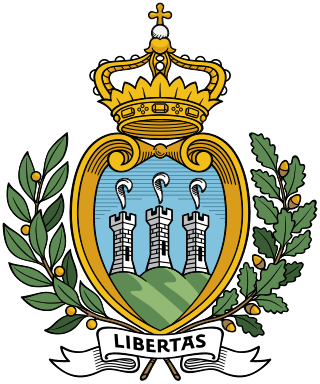A four-part referendum was held in Hungary on 26 November 1989. Voters were asked whether the President should be elected after parliamentary elections, whether organisations related to the Hungarian Socialist Workers' Party should be banned from workplaces, whether the party should account for properties owned or managed by it, and whether the Workers' Militia should be dissolved. All four proposals were passed, the first narrowly by 50.1% of voters, and the remaining three by 95% of voters. Voter turnout was 58.0%.

A twelve-part abrogative referendum was held in Italy on 11 June 1995. Voters were asked whether they approved of the repealing of laws on union representation, union dues, collective contracts for public sector workers, internal exile for mafia members, public ownership of RAI, concessions for television channels, advertising breaks during films, television publicity, commercial licensing, local council elections and shopping hours. Only five of the twelve proposals were passed.

A seven-part abrogative referendum was held in Italy on 15 June 1997. Voters were asked whether they approved of the repealing of laws on topics including privatisation, conscientious objectors, hunting, the judiciary and journalists, as well as whether the Ministry of Agrarian Politics should be abolished. Although all seven proposals were approved by voters, the voter turnout of 30% was well below the 50% threshold and the results were invalidated.

A double abrogative referendum was held in Italy on 15 May 2003. Voters were asked whether small companies should be forced to re-employ workers they had sacked illegitimately and whether the property owners could refuse to allow electricity cables to be installed on private property. Although both were approved by wide margins, the voter turnout of 26% was well below the 50% threshold and the results were invalidated.

A four-part abrogative referendum on fertility laws was held in Italy on 12 June 2005. Voters were asked whether research and access to the research on embryos should no longer be limited, whether embryos should no longer be legally recognised as people and whether IVF treatment should no longer be limited to three embryos. The referendum was called after the Italian Radicals collected the 500,000 signatures required. Although all four proposals were approved by wide margins, the voter turnout of 26% was well below the 50% threshold and the results were invalidated. Pope Benedict XVI had called for a boycott.
A referendum on building a coal-fired power plant was held in Slovenia on 10 January 1999. Voters were asked whether they approved of the construction of the TET3 coal-fired power plant. The proposal was rejected by 79.8% of voters, although voter turnout was just 27.3%.
A referendum on Sunday shopping was held in Slovenia on 21 September 2003. Voters were asked whether they approved of limiting shops to opening on ten Sundays a year. The proposal was approved by 58% of voters, although voter turnout was only 27.5%.
A referendum on political control of Radiotelevizija Slovenija was held in Slovenia on 25 September 2005. Voters were asked whether they approved of increasing political control of the country's public broadcaster. The proposal was approved by 50.7% of voters, although voter turnout was only 30.7%.
A referendum on further privatisation of Zavarovalnica Triglav was held in Slovenia on 11 November 2007. The referendum would approve the Amending the Ownership Transformation of Insurance Companies Act, which would allow Kapitalska družba to sell its shares in Zavarovalnica Triglav. The proposal was rejected by 71.1% of voters.

A referendum on the withdrawal of Soviet troops was held in Lithuania on 14 June 1992. Voters were asked whether Soviet troops should unconditionally and immediately withdraw from the country. It was approved by 92.6% of those voting and 69.0% of all registered voters, passing the 50% threshold.

A referendum on a law revoking privatisation deals was held in Lithuania on 27 August 1994. The proposed law put forward procedures for reversing privatisation deals conducted in a non-transparent manner, as well as compensating citizens for the loss of savings caused by inflation. A total of eight questions were asked, and although around 89% voted in favour of all of them, the voter turnout of 39.6% meant that the threshold of 50% of registered voters voting in favour was not passed, resulting in the proposal failing.

A four-part referendum was held in Lithuania on 20 October 1996 alongside the first round of parliamentary elections. Voters were asked whether they approved of three amendments to the constitution and whether money from the sale of state property should be used to compensate those who lost their Soviet-era savings due to inflation. The three constitutional amendments would reduce the number of members of the Seimas, fix the date for elections to be in the spring, and to reserve at least 50% of government expenditure to social spending.

A referendum on whether clergy should be eligible to sit in the Council of Government was held in Malta in 1870. It was approved by 96% of voters. Only 60% of those eligible to vote participated.

A referendum on the citizenship law was held in San Marino on 12 September 1999. Voters were asked whether the new citizenship law passed on 16 June should come into force. Although a majority voted in favour, the quorum of 32% of registered voters (9,663) was not achieved and the referendum failed.
A referendum on the retrospective disclosure of the financial details of large-scale privatisation was held in Slovakia on 22 October 1994. Although approved by 95.9% of those voting, voter turnout was just 20% and the referendum was declared invalid due to insufficient turnout.
A referendum on banning the privatisation of strategically important state-owned companies was held in Slovakia on 25 and 26 September 1998. Although approved by 84.3% of those voting, voter turnout was just 44.1% and the referendum was declared invalid due to insufficient turnout.
A four-part referendum was held in Switzerland on 11 May 1884. All four were rejected by voters.
Two referendums were held in Switzerland in 1887. The first was held on 15 May, asking voters whether they approved of a federal law on spirits, and was approved by 65.9% of voters. The second was held on 10 July, asking voters whether they approved of an amendment made to article 64 of the federal constitution, and was approved by 77.9% of voters and 20.5 cantons.
Five referendums were held in Switzerland in 1891. The first was held on 15 March on a federal law on federal officials who had become unemployable due to disability, and was rejected by 79.4% of voters. The second was held on 5 July on a constitutional amendment, and was approved by 60.3% of voters. Two referendums were held on 18 October, one on revising article 39 of the federal constitution and one on a federal law on Swiss tariffs; both were approved. The last was held on 6 December on the question of whether the federal government should purchase the Swiss Central Railway, but was rejected by 68.9% of voters.
A three-part referendum was held in Switzerland on 4 October 1896. Voters were asked whether they approved of a federal law on guarantees in the cattle trade, a federal law on the accounting system for the railways and a federal law on the disciplinary penal code for the federal army. Whilst the law on the railways was approved, the other two were rejected by voters.




